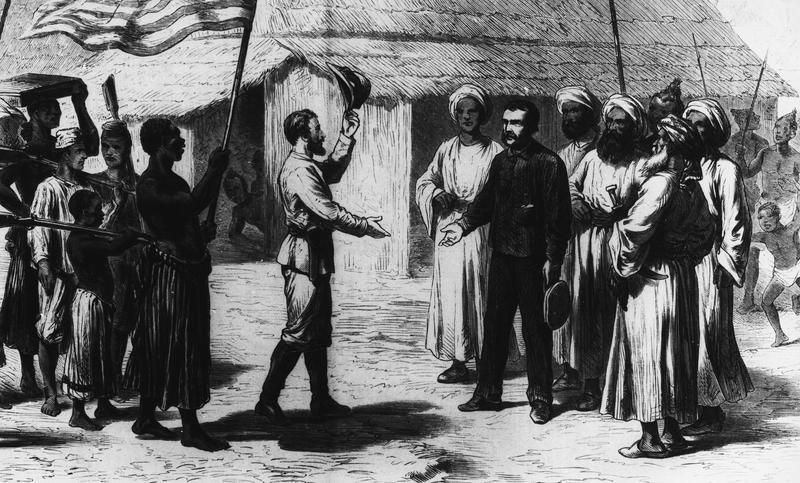Dr. Livingstone, I Presume
By | December 14, 2018

No one exemplified the dashing bravery of the Victorian-era British Colonialism like Dr. David Livingstone. A doctor, scientist, missionary, explorer, and rags-to-riches success story, Livingstone lived at a time when the British were obsessed with all things African. Livingstone’s personal obsession was finding the source of the Nile River, in part so he could be the explorer who discovered the source of the mighty river, and in part so it would give him fame, prestige, and power. He intended to use that power to influence others about the evils of slavery, a cause close to his heart. Things went bad for the intrepid explorer until his whereabouts were discovered by Henry Morton Stanley, who uttered the famous quip, “Dr. Livingstone, I presume.” What led to this meeting between European explorers in the heart of Africa?

Livingstone had led Several African Expeditions
British explorers were keenly interested in the mysterious and uncharted African continent, particularly the interior. In the mid-1800s, Dr. David Livingstone had already led other expeditions into the African interior and discovered many wonders and unique natural features. One of them was the spectacular waterfall that he named after Queen Victoria, Victoria Falls. Although Livingstone was one of the first Europeans to set eyes on Victoria Falls, Livingstone had the biggest prize in mind…the source of the Nile River.

Where was the Source of the Mighty Nile River?
British explorers were quite familiar with the Nile River from their explorations of Egypt, but the river was quite mysterious. First, it flowed northward, something that defied logic. Second, it is a vast waterway flowing through a desert, providing an important lifeline to the people living near its banks. Although water levels fluctuated, the Nile did not run dry. That meant that the source of the great river must be huge and impressive. Was there an enormous inland sea hiding in the African interior? British explorers wanted to be the first to find out.

Livingstone Goes Missing
Dr. Livingstone’s quest to find the source of the Nile River began in August of 1865. He had planned for the expedition to last two years, but when those two years were up, Livingstone was nowhere to be found. Little had been heard of Livingstone as the years ticked by. Speculations swirled about the fate of the determined explorer. Was he killed or kidnapped by hostile natives? Did he succumb to some strange illness? Had he gone off the grid and decided to stay in Africa permanently? The newspapers of the day, always looking for a sensational story, hyped the disappearance of Dr. Livingstone and kept the story in the public eye.

The Search is On
After six years passed with no word from Dr. Livingstone, the editor of the New York Herald, James Gordon Bennett, Jr, decided to see how far he could run with the news story of Dr. Livingstone’s disappearance. He fronted the money for a bold and daring young journalist and adventurer, Henry Morton Stanley, to mount a search and rescue journey to travel deep into the African interior to find the missing Dr. Livingstone. Stanley’s search started on March 21, 1871, after his team landed in an African port town.

Stanley Was Unprepared for the Rigors of the Quest
The last known location of Dr. Livingstone was Lake Tanganyika, so Stanley was determined to reach that spot in his search for the missing explorer. It would mean that the group would have to cross more than 700 miles of unforgiving terrain. Stanley had not been to Africa before his journey but was confident that his quest would be successful. What he found was a continent teeming with dangers. His group encountered vast swamplands filled with crocodiles that killed some of their pack animals. Swarms of tsetse fly attacked with a vengeance. Disease swept through the group. Stanley himself contracted dysentery, smallpox, and malaria on the journey, but continued on despite his ailments.

Stanley Heard of a White Man Living in Ujiji
As they neared Lake Tanganyika, Stanley and his party heard villagers talking about a white man who was living in the remote village of Ujiji. On November 10, 1871, after almost eight months in Africa, Stanley walked into Ujiji. Stanley’s arrival in the village of Ujiji caused a stir and a crowd gathered. Among the people, Stanley saw one white face, a thin and sickly old man with an unkempt beard. It was then that Stanley extended his hand and said the famous line, “Dr. Livingstone, I presume.”

Livingstone was in Poor Health and Downcast Spirits
Stanley learned that Livingstone’s quest to find the source of the Nile had encountered a number of serious setbacks. Much of their supplies and equipment were stolen and many of the men deserted. With no provisions, Livingstone had no choice but to accept the assistance of Arab slave traders. The Arabs put Livingstone in a cage and displayed it as a novelty for the local tribes. On July 15, 1871, he watched in horror as more than 400 Africans were slaughtered by slave traders on the shores of the Lualaba River. That incident broke Livingstone’s spirit. A series of tropical diseases broke his body.

Meeting Stanley Renewed Livingstone’s Spirits
Livingstone was unaware of his worldwide popularity as a missing explorer until Stanley told him about the nature of his expedition. Livingstone was bolstered by the news that people were still interested in his quest. Although Stanley had hoped to bring the feeble explorer back home with him, Livingstone was determined to finish out his journey. With supplies from Stanley, he set out once again. Livingstone traveled to Lake Bangweulu but his poor health returned. Within six months of his famous meeting with Stanley, Livingstone died of malaria on May 1, 1873. He never found the source of the Nile.

